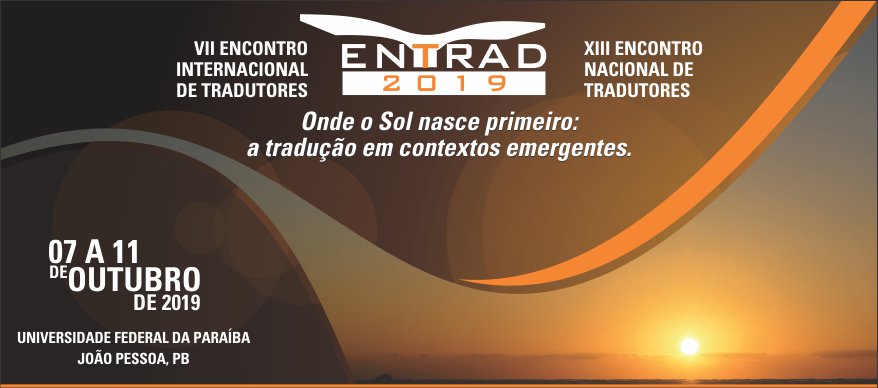Antes de se inscrever, leia as orientações AQUI
Os Estudos da Interpretação e suas múltiplas possibilidades
Interpreting Studies and its multiple possibilities
Reynaldo Pagura
University of Illinois at Urbana-Champaign
rpagura@illinois.edu
http://lattes.cnpq.br/7900046567006147
Glória Regina Loreto Sampaio
PUC-SP
gloria_sampaio@hotmail.com
http://lattes.cnpq.br/4748127296210591
Christiano Sanches
PUC-Rio
christianosanches@gmail.com
http://lattes.cnpq.br/4785357733398815
Idiomas de trabalho | Work languages: Português, English, Español
Resumo: Os Estudos da Interpretação (no sentido de “tradução oral”) sempre tiveram como foco a interpretação de conferências, por ser essa a modalidade mais antiga e mais organizada em questões profissionais. Embora a interpretação, ou tradução oral, em suas diversas modalidades (conferência, comunitária, jurídica, médica, comercial, religiosa, etc) seja uma das mais antigas atividades humanas, ela só passa a ser considerada profissão na primeira metade do século XX, com a criação da Liga das Nações, e ganha impulso e reconhecimento após a II Guerra Mundial, com a criação de organizações internacionais, como a ONU, a OTAN e a CECA, embrião da atual União Europeia. Contudo, nos últimos anos, vêm surgindo estudos sobre outras modalidades de interpretação, notadamente a comunitária, a jurídica e a médica, já bastante profissionalizadas nos Estados Unidos, Canadá e alguns países da Europa, devido ao grande volume de imigrantes atraídos por esses países. Os Estudos da Interpretação (a partir de Interpreting Studies, expressão utilizada pela primeira vez por Daniel Gile, na primeira metade da década de 90 do século passado) ganham força como disciplina acadêmica ao se apagarem as luzes do século XX, ainda prioritariamente na Europa. As pesquisas da área fazem interface com diversas “subáreas” dos Estudos da Tradução, a saber, a historiografia, os estudos de corpus, as questões relacionadas ao ensino e avaliação, entre outras. Cada vez mais, verifica-se a produção de trabalhos voltados a aspectos específicos da interpretação em seus diversas contextos. Recentemente, o interesse pela aplicação da tecnologia e seus efeitos sobre a qualidade do trabalho do intérprete e sobre o mercado em si têm despertado bastante interesse, assim como questões de gênero e aspectos sociológicos da profissão. No Brasil, a área é ainda incipiente, tendo sido poucas as pesquisas divulgadas. Não há nenhum programa de pós-graduação voltado especificamente à área, nem qualquer periódico dedicado exclusivamente aos Estudos da Interpretação (EI). Esperamos que os trabalhos apresentados neste X ENTRAD possam estimular ainda mais a pesquisa voltada aos EI, criando a massa crítica necessária para o estabelecimento definitivo dessa área de estudos no Brasil. A proposta do Simpósio é acolher todas as vertentes de estudos que tenham como objeto a interpretação (oral): a interpretação de conferências, a comunitária, a jurídica e a médica, em estudos e/ou relatos de experiências voltados a questões teóricas, à formação de intérpretes, à história da profissão, entre outras possibilidades. Em resumo, pretende-se acolher todas as interfaces dos Estudos da Interpretação, excetuando-se a Interpretação em Línguas de Sinais, por se constituir área temática separada neste ENTRAD.
Palavras-chave: Interpretação, Múltiplas interfaces, Línguas orais
Abstract: Interpreting, or oral translation, in its different modes and settings – one of the oldest human activities – starts to be considered a profession in the first half of the 20th century with the creation of the League of Nations. It is given impulse and receives recognition after the II World War, with the creation of international organizations such as UN, NATO and ECSC, which later unfolded into the European Union. Over the last few years, other interpreting settings have attracted severall studies; among those settings are community interpreting, court interpreting, medical interpreting, all of those considered full-fledged professions in the United States, Canada, and some European countries, due to the large number of immigrants in these countries. Interpreting Studies (a term coined by Daniel Gile in the early 1990’s) become stronger as an academic discipline by the end of the 20th century, particularly in Europe. Research in the field taps into many branches of Translation Studies, such as historiography, corpus linguistics, issues related to teaching/learning and assessment, among others. Each time more, there have been several pieces of research focusing several aspects of interpreting, in its different setting and modalities. Recently, the field has attracted research targeting the use of technology in interpreting and its effects on the work of the interpreter and the market itself. Also, gender-related issues and sociological aspects of the profession have been studied. Interpreting Studies in Brazil, though still relatively incipient, are gaining momentum, but not much research has been published. There are no graduate programs with a specific focus on interpreting, nor is there any journal exclusively dedicated to the publishing of research in Interpreting Studies. We hope that research presented during this X ENTRAD may promote even more the research geared at Interpreting Studies, thus generating critical thinking needed for the definite establishment of this field of studies in Brazil. This Symposium aims at accepting research in all sub-fields that have (spoken) interpretation: conference interpreting, community interpreting, court interpreting and medical interpreting, as well as studies/reports on theoretical issues, interpreter training, professional history, among others. In short, all interfaces of Interpreting Studies, excepting sign language interpreting, since this has been included as an independent topic in this ENTRAD.
Keywords: Interpreting, Multiple possibilities, Spoken languages
Antes de se inscrever, leia as orientações AQUI
